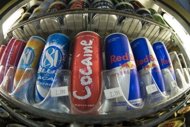Australia experts call for energy drink warnings

Health professionals from the University of Sydney's Medical School and the New South Wales Poisons Information Centre said reports of adverse reactions to drinks like Red Bull and V jumped from just 12 in 2004 to 65 in 2010.
Over the seven years to 2010, 297 calls for assistance were recorded with at least 128 people hospitalised with symptoms including heart palpitations, agitation and stomach upsets.
Of these, 20 people had more serious issues, such as seizures and hallucinations.
The study, published in the Medical Journal of Australia on Monday, said the average person affected was 17 years old and that they often mixed energy drinks with alcohol.
"Our study demonstrates the extent of the growing problem in Australia with energy drink consumption and toxicity, particularly among adolescents," the study's authors wrote.
"Given the clear evidence of toxicity and the growing number of hospitalisations associated with consumption of energy drinks... health authorities should increase awareness of the problem, improve package labelling and regulate caffeine content."
They recommended that "labelling and any marketing of these products should include appropriate health warnings and the national poisons hotline number". A can of energy drink may contain up to 300 milligrams of caffeine -- compared to an average 65-120mg for a cup of drip coffee -- and Poisons Centre medical director Naren Gunja called for more thorough regulation.
"Things to look at would be... how much caffeine do these drinks contain, how many can you buy at once, what age should you be when you buy them, should there be an age limit to being sold the drinks," he said.
What the stars mean:
★ Poor ★ ★ Promising ★★★ Good ★★★★ Very good ★★★★★ Exceptional
Latest News
More News
- Russian President congratulates Vietnamese Party leader during phone talks (January 25, 2026 | 09:58)
- Worldwide congratulations underscore confidence in Vietnam’s 14th Party Congress (January 23, 2026 | 09:02)
- Political parties, organisations, int’l friends send congratulations to 14th National Party Congress (January 22, 2026 | 09:33)
- 14th National Party Congress: Japanese media highlight Vietnam’s growth targets (January 21, 2026 | 09:46)
- 14th National Party Congress: Driving force for Vietnam to continue renewal, innovation, breakthroughs (January 21, 2026 | 09:42)
- Vietnam remains spiritual support for progressive forces: Colombian party leader (January 21, 2026 | 08:00)
- Int'l media provides large coverage of 14th National Party Congress's first working day (January 20, 2026 | 09:09)
- Vietnamese firms win top honours at ASEAN Digital Awards (January 16, 2026 | 16:45)
- ASEAN Digital Ministers' Meeting opens in Hanoi (January 15, 2026 | 15:33)
- ASEAN economies move up the global chip value chain (December 09, 2025 | 13:32)
















 Mobile Version
Mobile Version